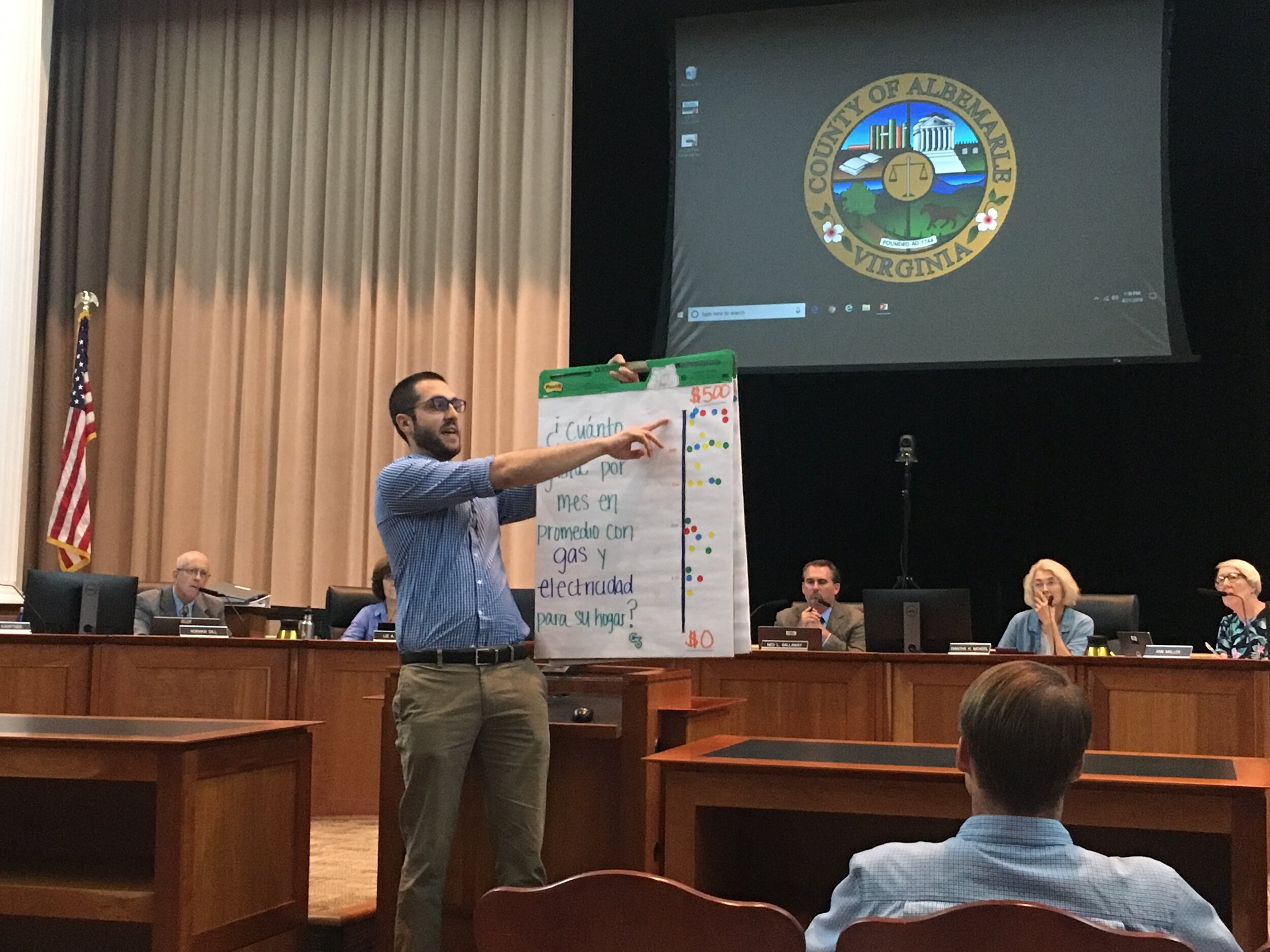Climate Policy January Update
Join Caetano de Campos Lopes every month for a climate policy update. He’ll share his latest research, reports, and perspectives on ways to move our community forward on climate.
2019 set a historic milestone for our community. Charlottesville and Albemarle, with strong support of C3’s network, unanimously adopted climate goals of 45% reduction of greenhouse gases (GHG) emissions by 2030 [1] and carbon neutrality by 2050. Now it’s time to start implementing the necessary instruments to ensure our success on achieving the targets. In this first blog, I’d like to share some of the exciting research I’ve been working on and some of what you can expect in 2020 from C3’s policy front.
New Reports
State-Level Policy
Empowering local advocates with quality information, last week we released C3’s Virginia’s 2020 General Assembly review with highlights of the major climate policies that are currently being debated at the state’s Capitol. On that note, we are thrilled that both Charlottesville’s City Council and Albemarle’s Board of Supervisor have unanimously voted to sign a "We Are Still In” [4] letter in support of the advancement of strategic state level climate policies that will assist our local efforts.
Incentives for Your Home and Business
With a wide variety of available incentives at the local, state, and federal levels, it can be difficult to identify which ones are most applicable to you or your business. We have just finalized a report detailing the full list of existing climate incentives [5] that our areas’ households or businesses can use right now, as well as compiling a list of effective incentives available in similar communities that we may want to adopt here. View C3’s report on Incentives for Climate Action.
Ready to Act?
Our presence during governmental meetings will be crucial for the implementation of climate policies essential to achieve our community’s climate goals. Here is a list of upcoming meetings:
County’s residents
On Wednesday, February 19, it will present the first draft of Albemarle County’s FY21 budget.
City’s residents
The Charlottesville’s City Council resumed its FY2021 budget development work-session this week, which will continue until early April. C3 will soon release our local climate policy recommendations for this year.
In the Queue
Be on the lookout for the following reports that C3 will release over the next several weeks.
Local GHG Analysis
The most significant sources of our community’s GHG emissions are transportation, residential, and commercial building energy use (electricity and natural gas), and municipal solid waste. Developing a better understanding of the main emissions’ drivers is key to uncovering what sources have the greatest potential to reduce our emissions, and what initiatives should be prioritized. We are currently reviewing the existing information provided by our communities GHG inventories and will benchmark it to other comparable municipalities and our state as a whole.
Energy Equity
Among our top climate efforts should be the alleviation of the high energy burden [2] experienced by some of our community members [3]. As a crucial first step in addressing this burden, we have been analyzing neighborhood-level data to develop a map of our most relevant energy burdened hotspots and pinpointing how different housing-stock features and households’ characteristics relate to energy burden levels. We hope this information will allow climate policies to achieve the highest energy conservation levels while significantly increasing the livability of our distressed households.
Local Effects of Climate Change
Although we see the effects of climate change happening all around the world -- from the wildfires in Australia to record flooding conditions in tropical countries. Less often we hear of what we can expect at a local level; so C3 will be releasing a report on the expected local effects of climate change in the next two weeks.
We sure have a lot of work to do, but we are also well positioned to make this another year of successful climate action. We need you to help us ensure that a larger and broader spectrum of our community are helping to advance climate policies, as well as write to our local leaders to show the urgency and importance of taking action.
Will you join our policy conversation? Contact policy@cvilleclimate.org to stay tuned on our last policy advocacy opportunities.
—Caetano
Footnotes
[1] The City of Charlottesville’s 2030 goal uses the GHG emission levels of its 2011 GHG Inventory as the baseline year, while the County of Albemarle uses its 2008 GHG Inventory.
[2] Households with an elevated share of their income designated for paying its energy bills.
[3] It seems that it is never too much to remember the results of our quick survey during Southwood’s back to school event in August 2019, where the majority of the area’s households self-reported shocking energy bills of between $200 and $500 per month.
[4] "We Are Still In” (WASI) is a coalition of municipalities, universities, and businesses who have pledged to stay committed to the Paris Climate Agreement even after the US announcement of abandoning it.
[5] Public or private sector incentives to help households live in a more climate-friendly and affordable manner.

